Saturday, November 16, 2024 08:33 PM
Netanyahu's UN Address: Escalating Military Operations Against Hezbollah
- Netanyahu vows to intensify military actions against Hezbollah.
- Proposed 21-day truce now seems unlikely amid rising tensions.
- Civilians face severe consequences from ongoing military conflicts.
 Image Credits: france24
Image Credits: france24Netanyahu addresses the UN, emphasizing military actions against Hezbollah amid rising regional violence and a proposed truce.
In a significant address at the United Nations on Friday, Israeli Prime Minister Benjamin Netanyahu reaffirmed his commitment to intensifying military operations against Hezbollah, the militant group based in Lebanon. This announcement comes amid rising tensions and violence in the region, which have left many wondering about the prospects for peace. The backdrop of Netanyahu's speech is marked by a recent proposal for a 21-day truce, put forth by France and the United States, aimed at easing hostilities and fostering dialogue.
Netanyahu's remarks have dashed hopes for a ceasefire, as he emphasized the necessity of continuing military actions against Hezbollah, which he described as a significant threat to Israel's security. The Israeli government has been on high alert, responding to what it perceives as provocations from Hezbollah, which has been involved in various confrontations along the Israel-Lebanon border.
The situation in the region is complex, with historical grievances and ongoing conflicts contributing to the current state of affairs. Many observers believe that a prolonged military campaign could lead to further instability, not only in Lebanon but across the broader Middle East. The proposed truce, which aimed to provide a window for humanitarian aid and diplomatic negotiations, now seems increasingly unlikely.
As the world watches these developments, it is crucial to consider the human impact of such military actions. Civilians often bear the brunt of conflicts, facing displacement, loss of life, and a lack of basic necessities. The international community continues to call for dialogue and peaceful resolutions, emphasizing that military solutions often lead to more significant problems down the line.
Netanyahu's firm stance at the UN highlights the challenges of achieving peace in a region fraught with tension. While military actions may seem necessary from a security perspective, the long-term consequences for both Israel and Lebanon could be dire. It is essential for leaders to prioritize dialogue and seek sustainable solutions that address the root causes of conflict, rather than merely responding to immediate threats. Only through understanding and cooperation can a lasting peace be achieved in this troubled region.













